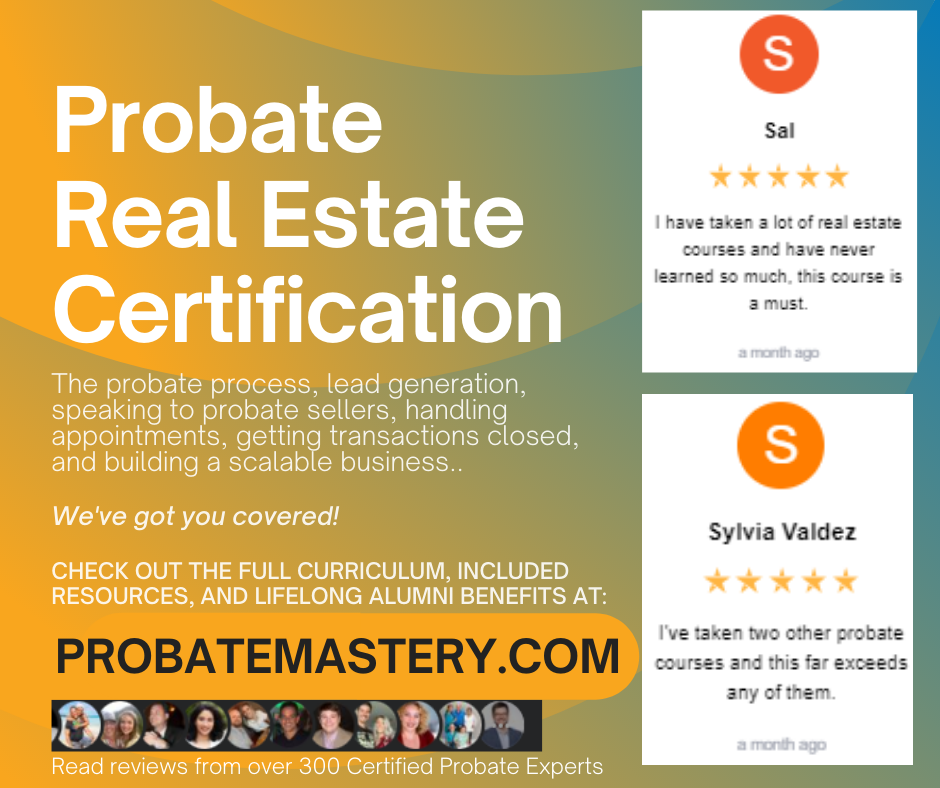This Estate Professionals Mastermind Podcast episode features group real estate coaching on using a seller net sheet, helping clients use lease options to purchase property, and creative real estate tax strategies.
In this podcast episode, Certified Probate Experts share tips for using price anchoring in sales negotiations, helping immigrants and faith-based investors purchase properties when traditional financing isn’t an option, using the slow flip strategy to increase profit margin and reduce taxes on investments, and presenting price options using a seller net sheet on listing appointments. Also, this episode is a must-watch if you’re wondering how to approach real estate leads as both a licensed real estate agent and an investor.
This week’s challenge: Just do the deal! If you skip to 20:10, you can hear David Pannell give Federico some cold-hard-truth real estate motivation
Thanks for tuning in and if you’d like to become a Certified Probate Expert yourself, you can get started today or check out this introductory webinar
Episode #46 of Estate Professionals Mastermind – Probate Podcast
Join the Estate Professionals Mastermind Facebook group for real estate networking, scripts role-play, high-energy community support, and bite-sized real estate tips.
Get Certified in Probate Real Estate
Make sure you’re in our Facebook Group
Training Topics In Seller Net Sheets and Slow Flipping Houses: Episode 46 (YouTube Links):
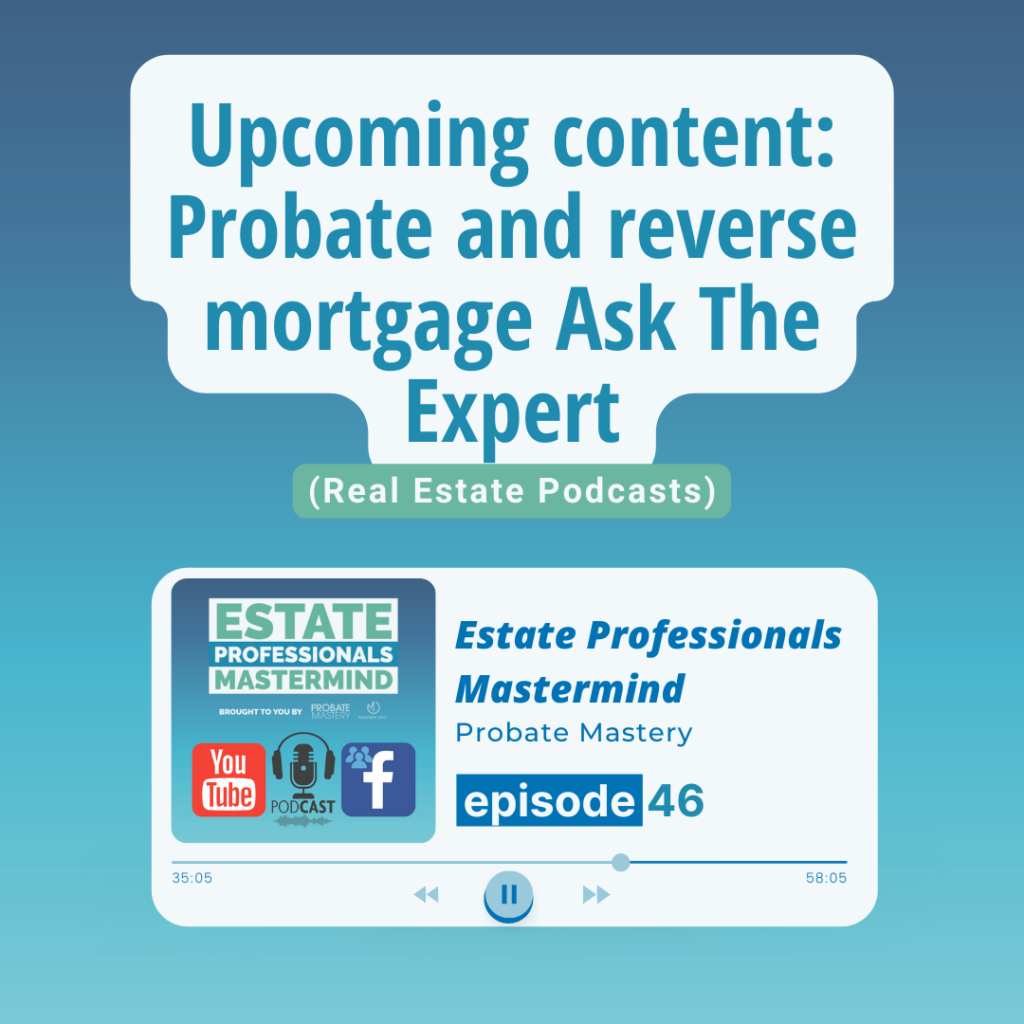
0:00 Upcoming content: Probate and reverse mortgage Ask The Expert
(Real Estate Podcasts)
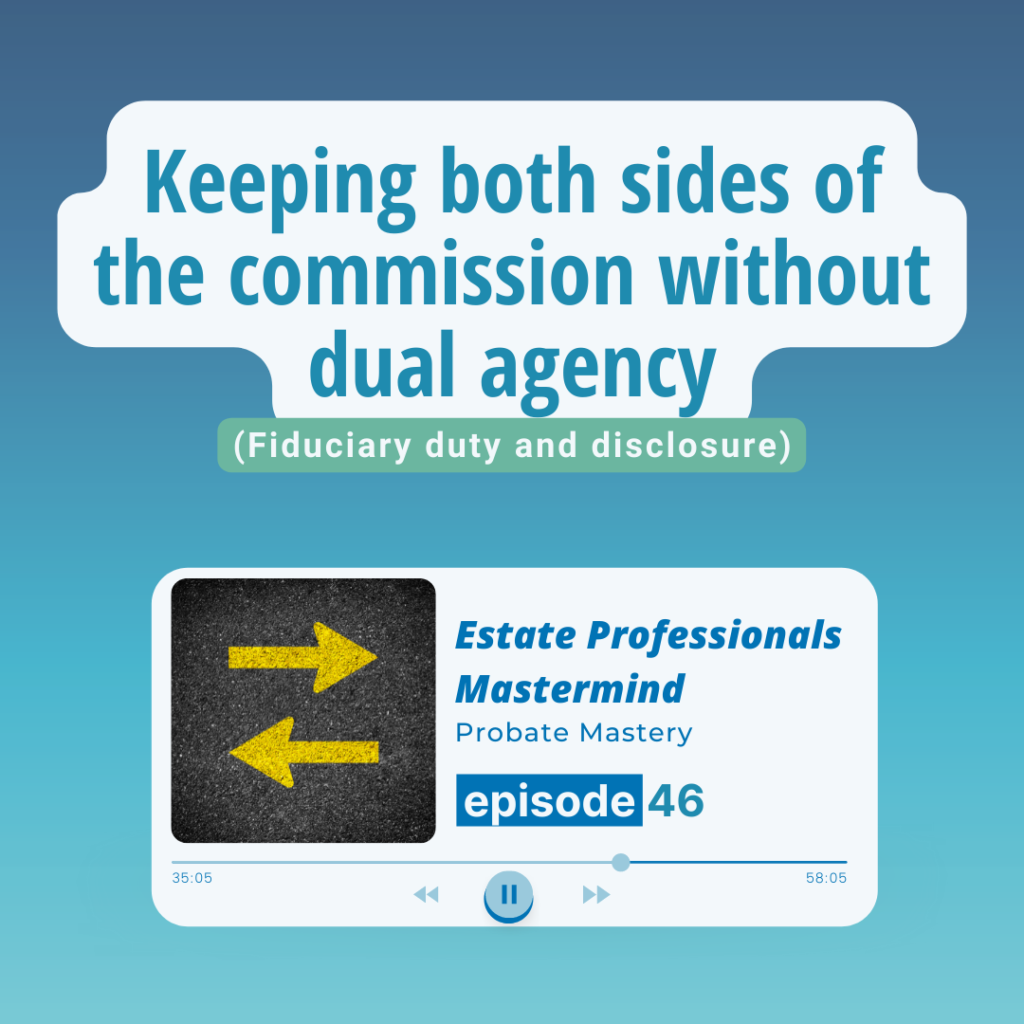
0:55 Keeping both sides of the commission without dual agency
(Fiduciary duty and disclosure)
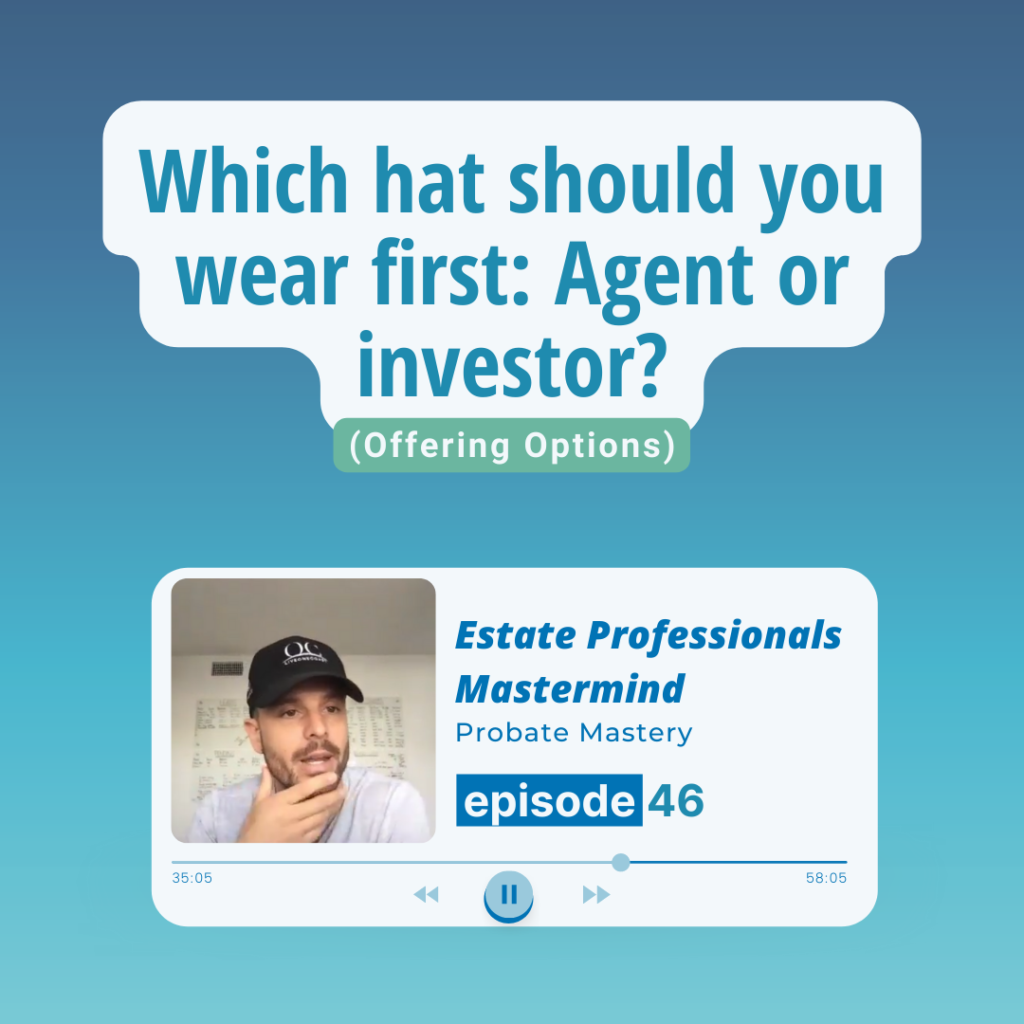
4:17 Can you be a real estate agent and investor?
(Offering Options)
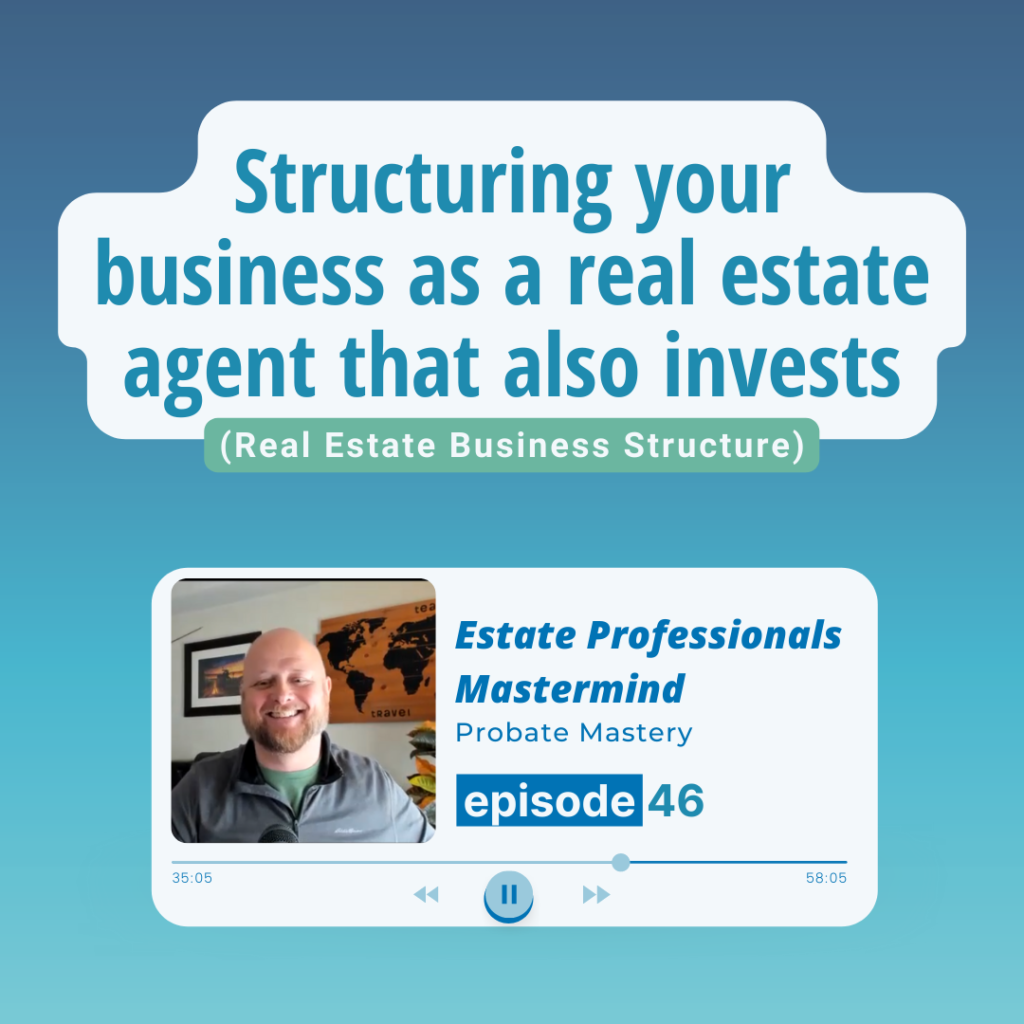
6:32 Structuring your business as a real estate agent that also invests
(Real Estate Business Structure)
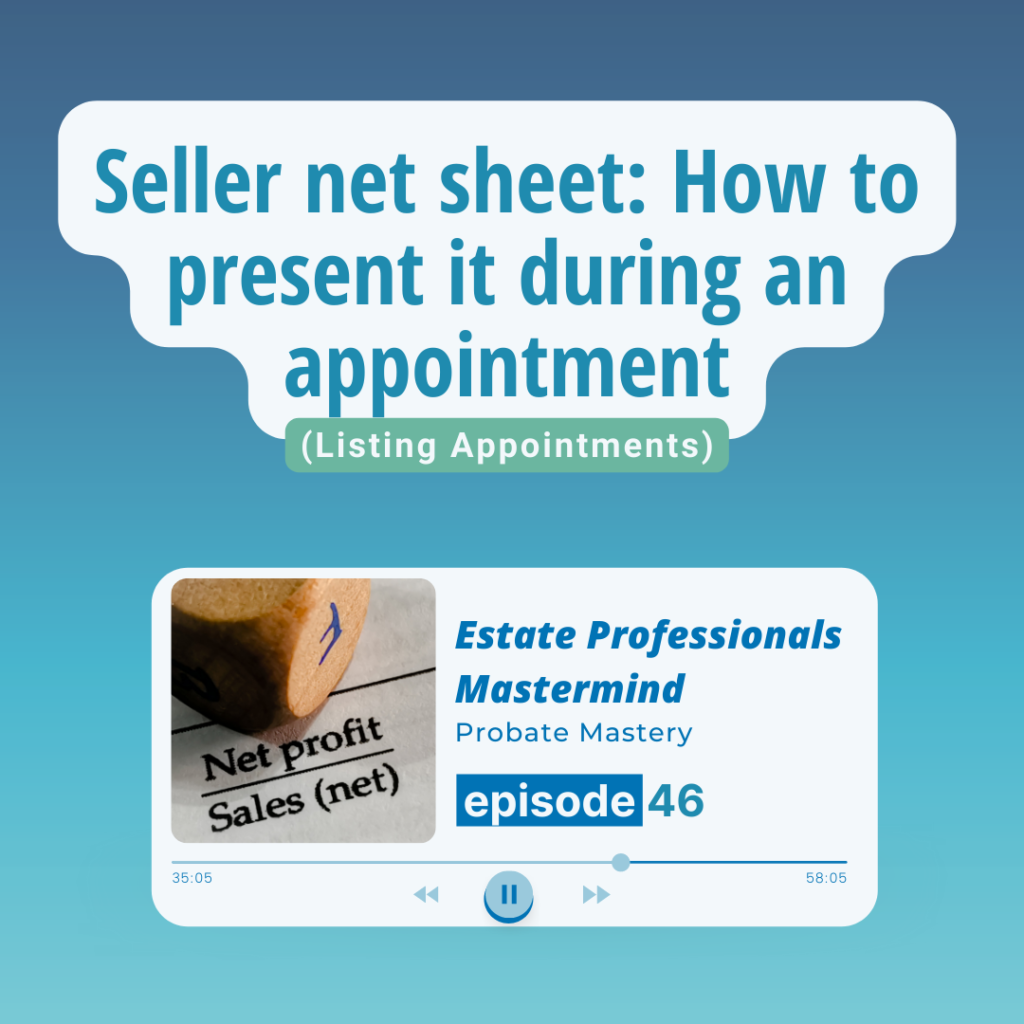
9:01 Seller net sheet example conversation: What do you say in a listing appointment?
(Real Estate Appointments)
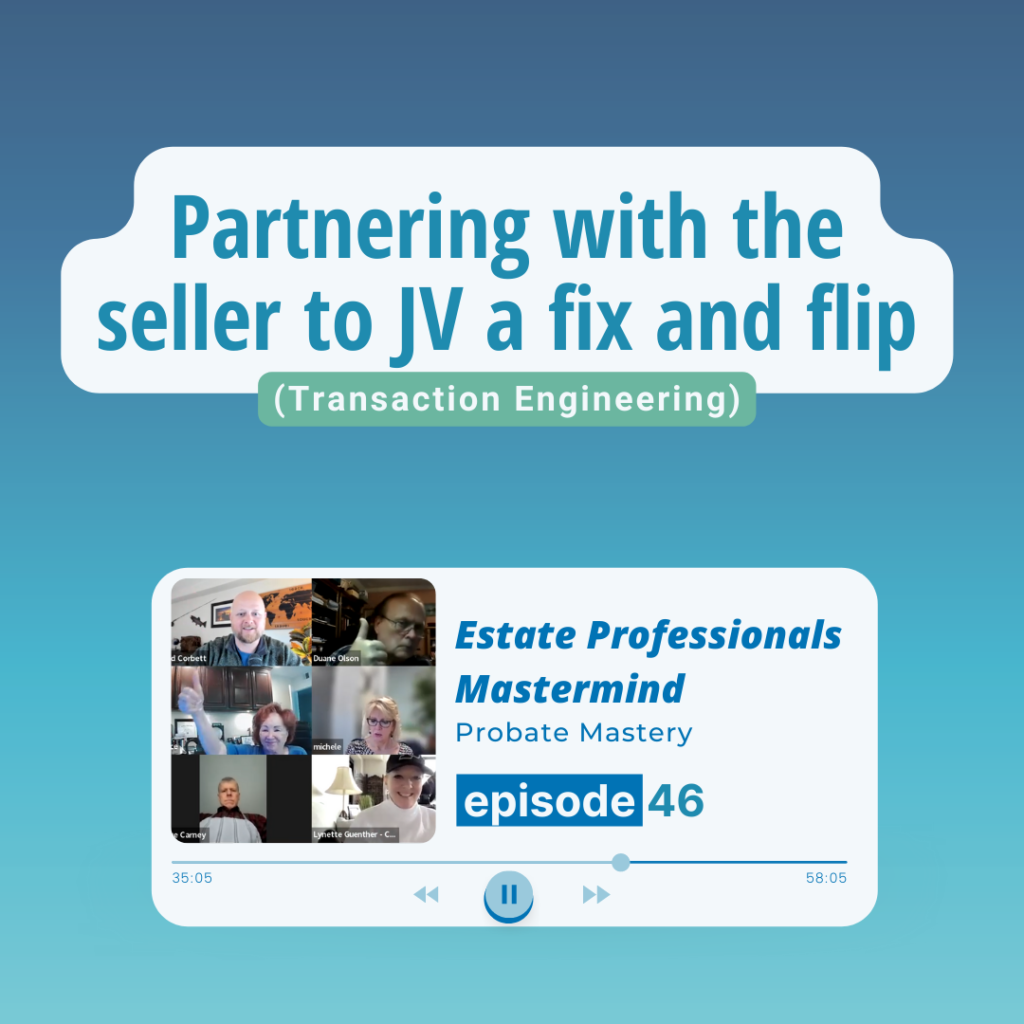
13:47 Partnering with the seller to JV a fix and flip deal (Seller Net Sheet Options)
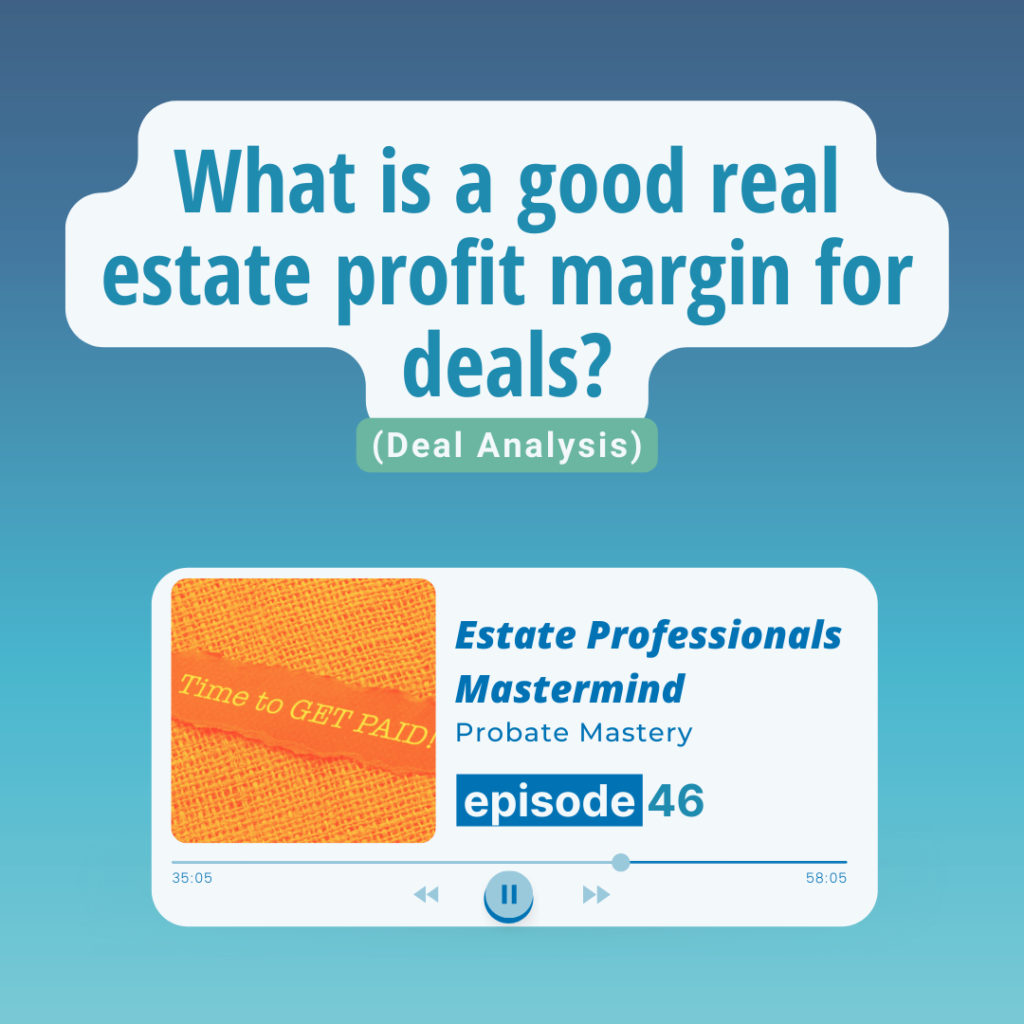
17:12 What is a good real estate profit margin for deals?
(Getting Paid in Real Estate)
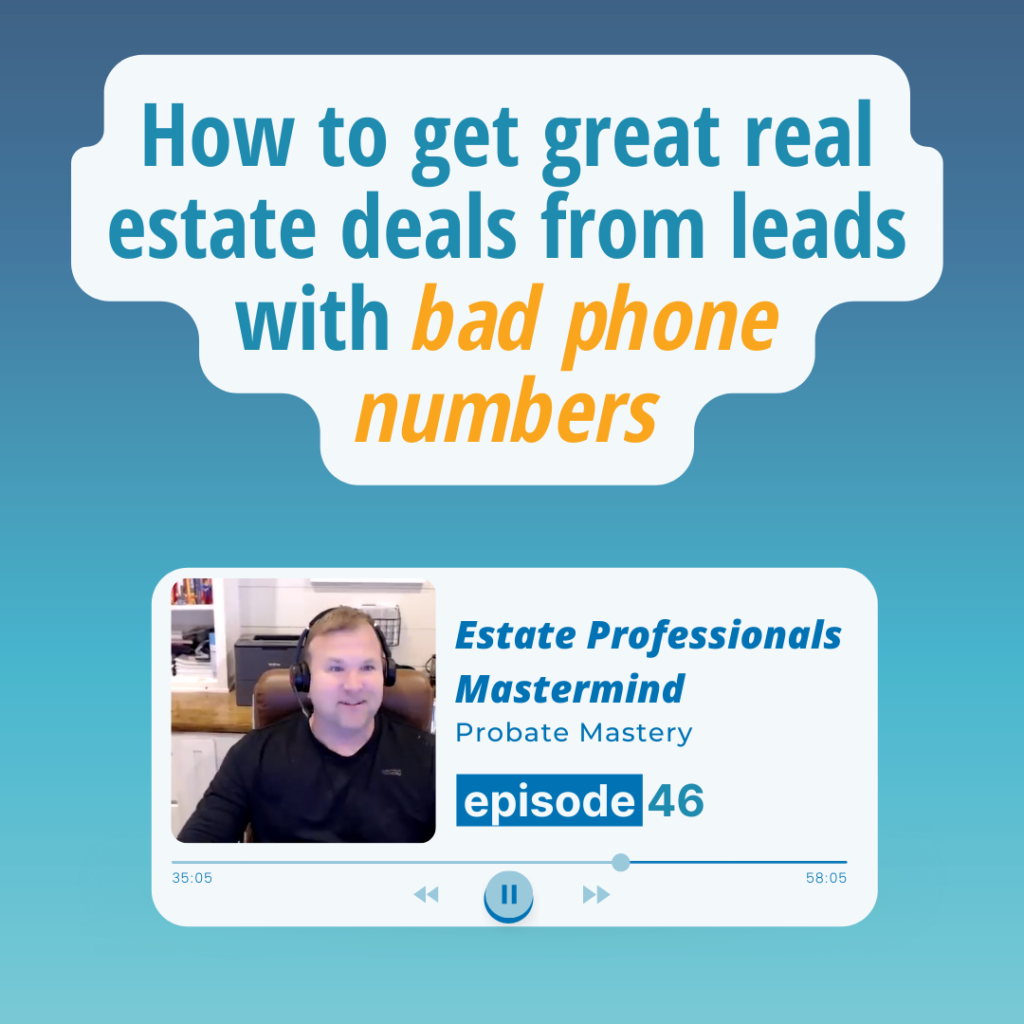
21:17 How to get great real estate deals from leads with bad phone numbers
(Real Estate Prospecting)
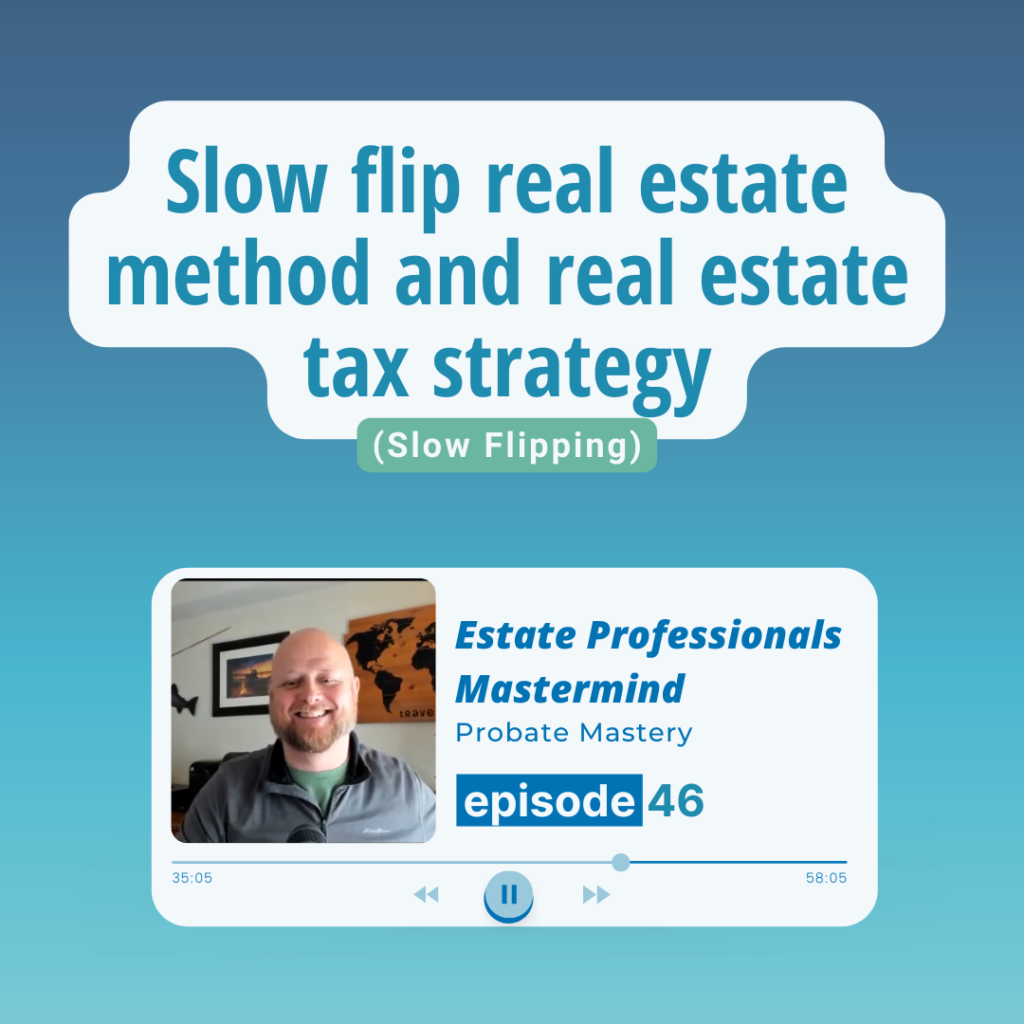
23:09 Slow flip real estate method and real estate tax strategy
(Slow flipping houses)
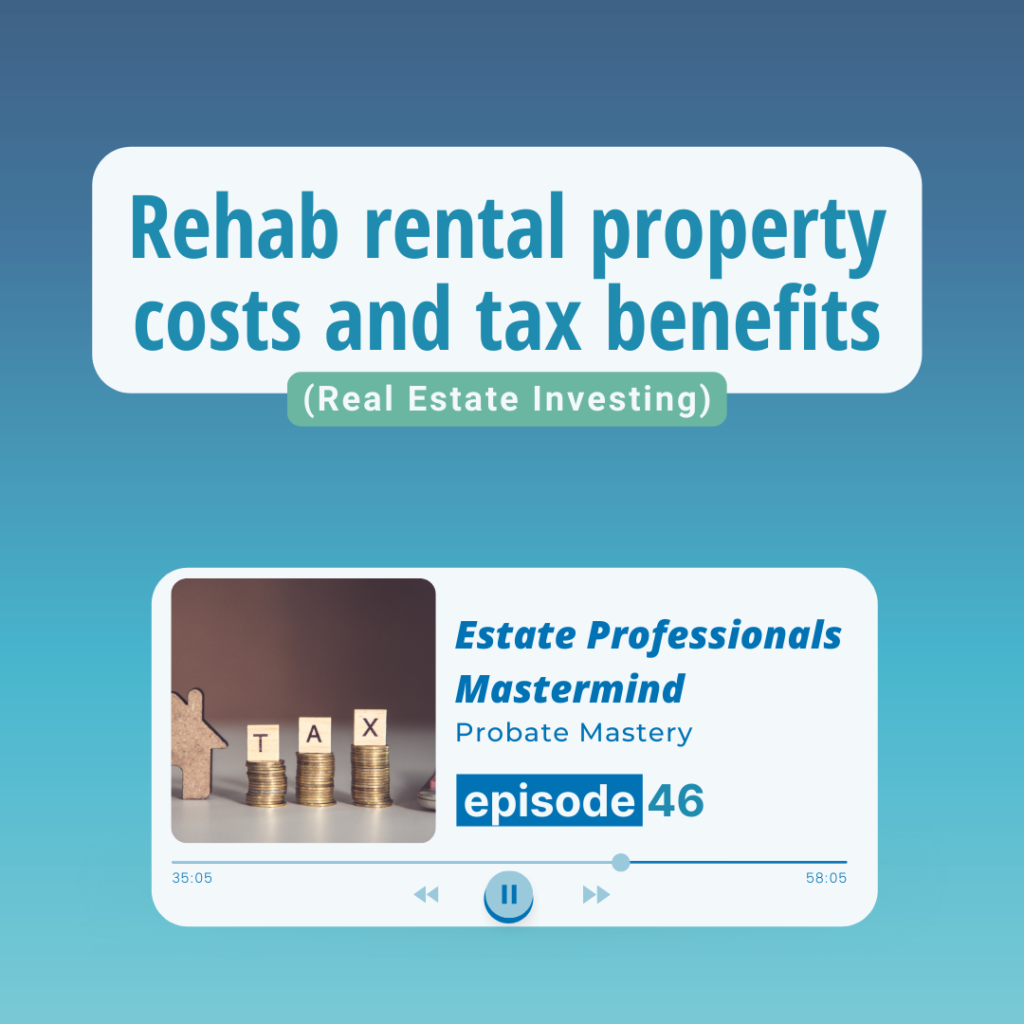
24:11 Rehab rental property costs and tax benefits
(Rental Property Rehab)
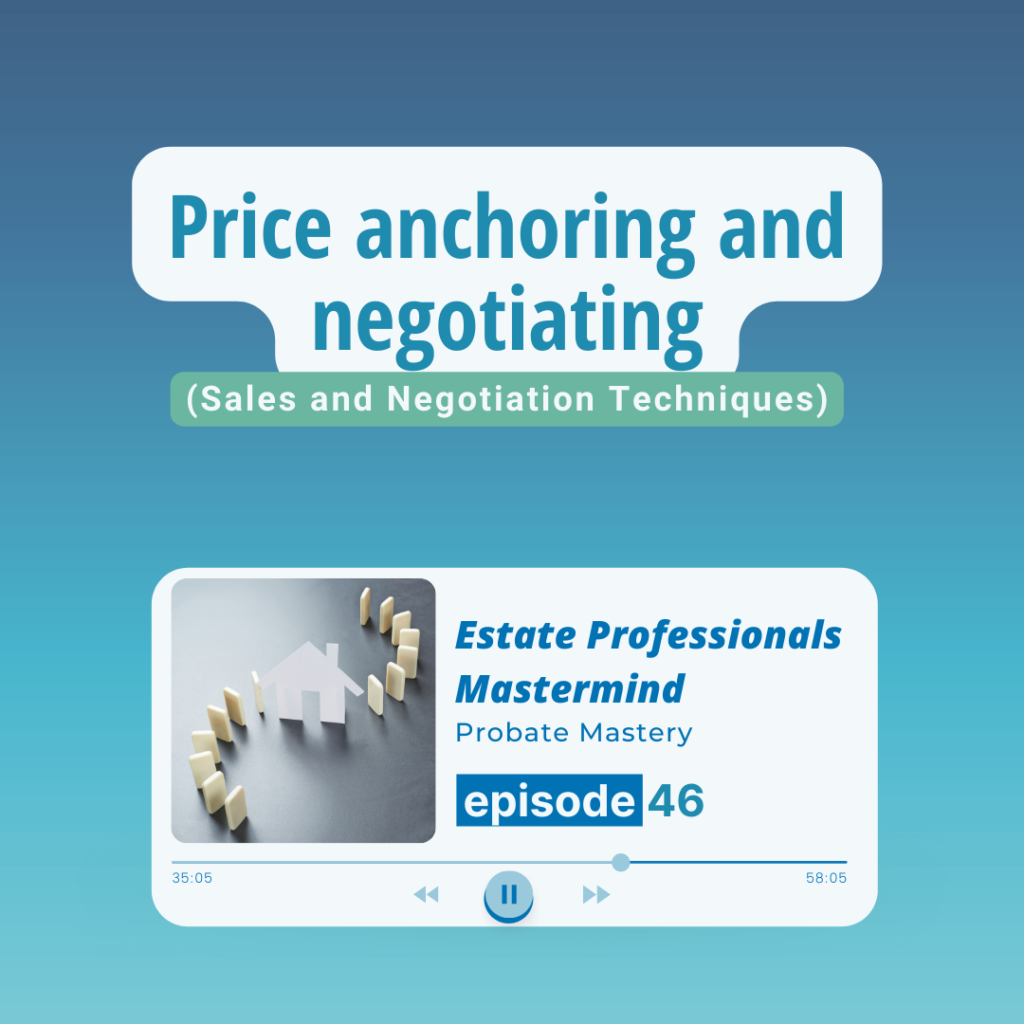
25:54 Price anchoring and negotiating
(Sales and Negotiation Techniques)
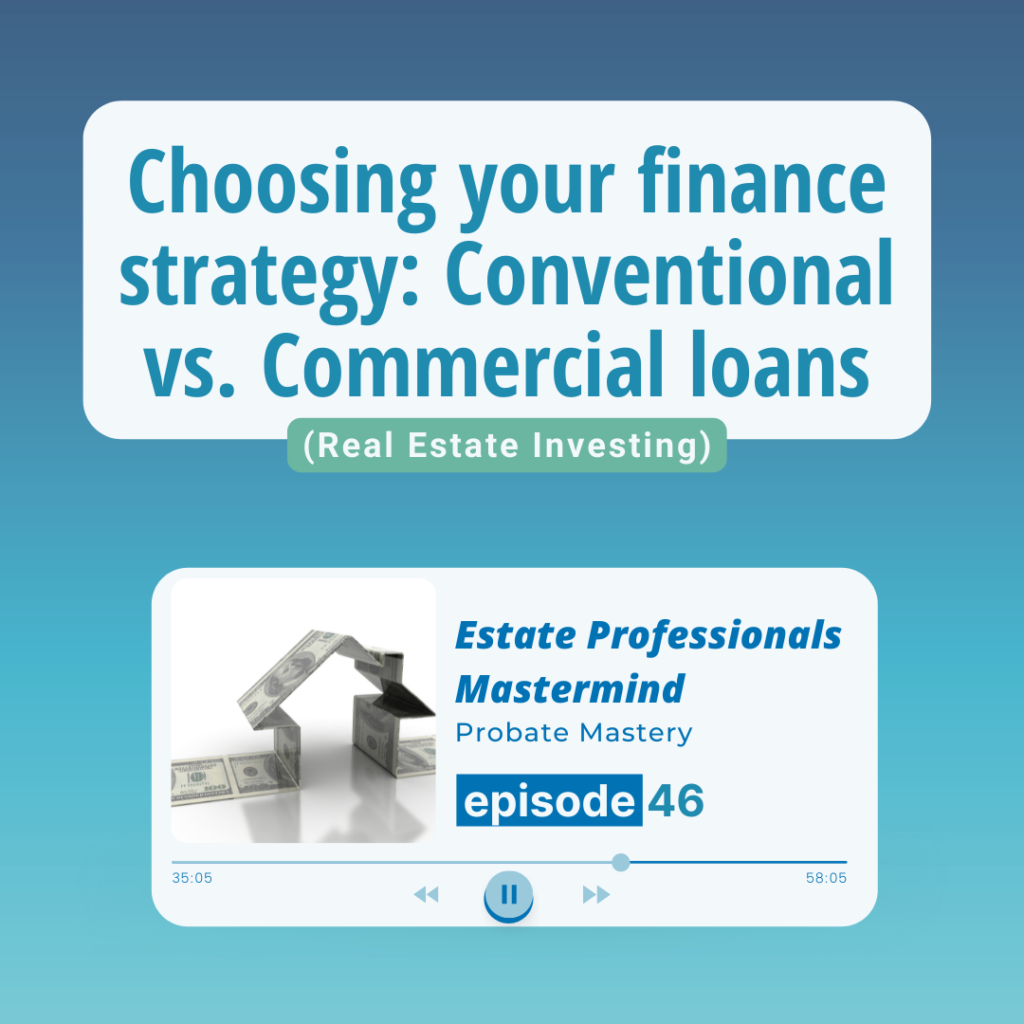
32:10 Choosing your finance strategy: Conventional vs. Commercial loans
(Real Estate Investing)
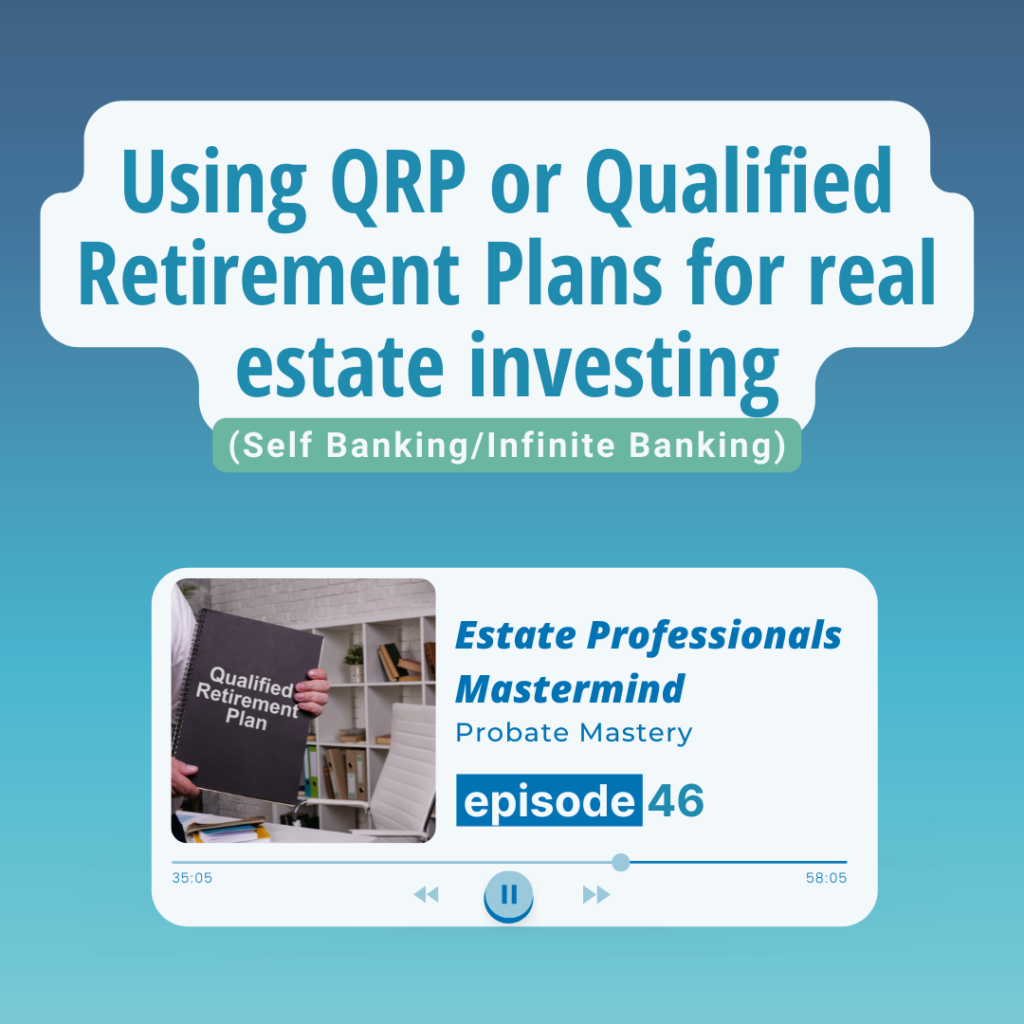
36:58 Using QRP or Qualified Retirement Plans for real estate investing
(Self Banking/Infinite Banking)
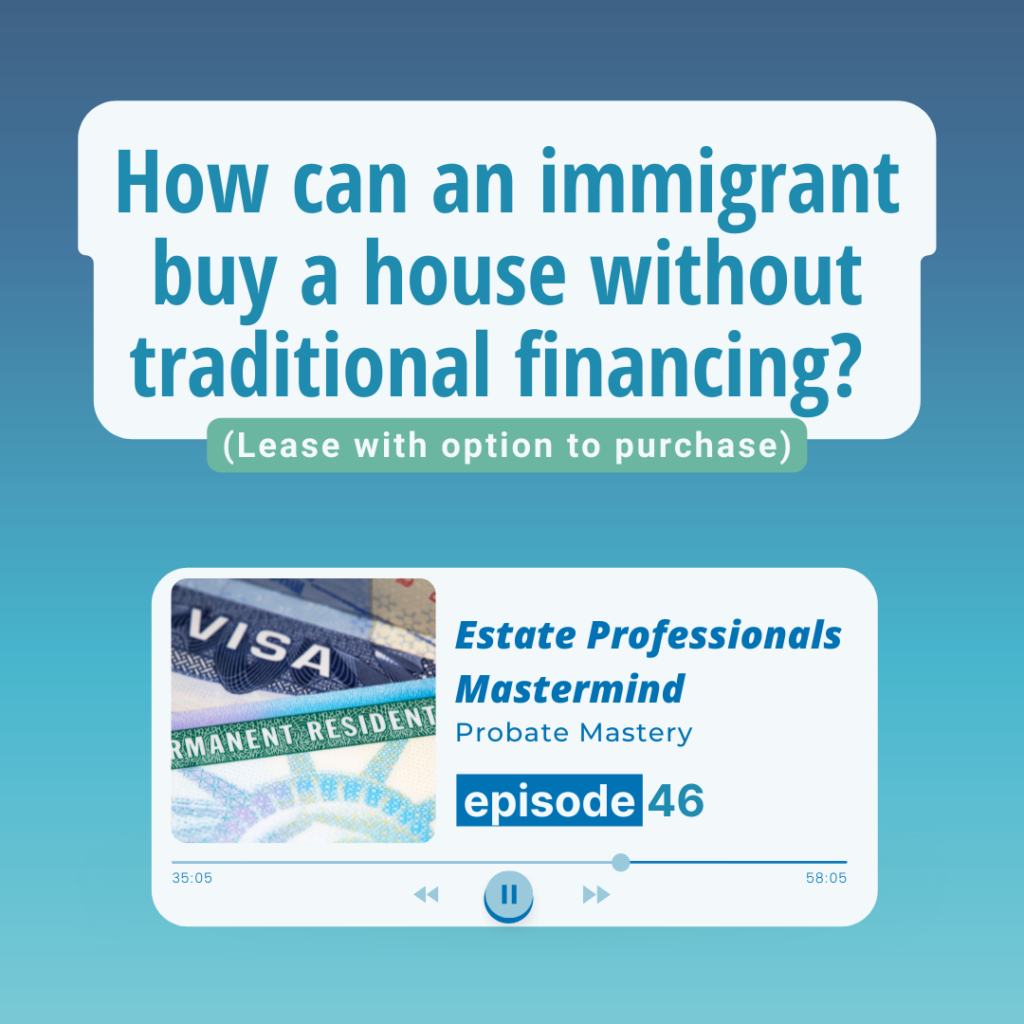
43:11 How can an immigrant buy a house without traditional financing?
(Lease with option to purchase)
Training Resources:
- Free Probate Webinar: Probate Fast Track Webinar – Probate Mastery
- Take Chad’s Probate Course and get Certified in Probate Real Estate
- Become a Probate Mastery course affiliate https://probatemastery.samcart.com/affiliates/signup
- Join Estate Professionals Mastermind Group (Facebook)
- Learn Probate, Real Estate Investing, Creative Finance, and more on our YouTube Channel
- Most recent content:
- Episode 44 Group Coaching: Real Estate Clients: Finding high net worth and celebrity buyers PODCAST
- Episode 45 Ask The Expert: What the best real estate ISA systems get right: Tips from Andy Cole of 0260 Labs – Probate Mastery
- Propstream trial: PropStream Investment Software (propstreampro.com)
- Get the free QRP book, delivered to your door: The Secret Retirement Plan for you to get Full Control of your 401k & IRA money and AVOID the IRA Tax on Real Estate Investments like Apartments! Request free here.
- Relevant Training Content:
- Ask The Expert with Chris Prefontaine: Creative Real Estate Investing – Probate Mastery
- Christie Duffy one-on-one coaching with Chad Corbett: https://probatemastery.com/how-to-jv-a-deal-in-probate-live-probate-real-estate-training-chad-corbett/
Real Estate Seller Net Sheet and Slow Flipping: EPISODE TRANSCRIPT
Download full transcript as a PDF: Seller net sheet example conversation and the Slow Flip Real Estate Strategy _ Live Real Estate Q&A.docx (1).pdf – Google Drive
Upcoming content: Probate and Reverse Mortgage Ask The Expert (Real Estate Podcasts) [00:00:00]
Welcome everybody to the weekly probate real estate coaching call. Lots of familiar faces here. Thank you guys. Um, I want to start this week by giving Duane Olson the thanks he deserves. I rushed off to make a four o’clock call. Last week I had to abruptly end the call. You followed up and came through, made an introduction with Jason.
So we recorded a podcast today about all the ins and outs of reverse mortgages, and then more specifically how those apply to the probate situation and also how you can leverage a reverse mortgage lender as one of your team members to build a probate referral network.
So Duane I appreciate you, especially as a first-time attendee of the call. I’ve looked for quite a while for the right lender who shares the same business values and ethics that we find to be present in pretty much everybody in this group. So I appreciate that introduction.
And thank you. You’re welcome. Thank you.
Keeping both sides of the commission without dual agency (Seller Net Sheet and Multiple Options) [00:00:56]
And Federico, you seem eager to get it out, man. What do you get for us? No, it’s I didn’t think I’d get to this as fast as it did, but talking to you I always feel more comfortable doing things on, I have little to no experience in.
And what that is a family friend reached out, says she wants to sell a condo that she has. Her partner bought it in cash for her years ago.
I don’t know if they’re married, but I think they’d been together for 20 plus years.
So he bought her a condo as a real estate investment for her. And one of his friends resided in the condo up until I think a month ago until he passed. Okay. So he lived there for free. She now wants to sell this condo, sell or lease. The condo is obviously in a relatively distressed property condition. She said, what should we do?
And I said, look, I’ll provide you with options. And then we can do whatever is best for you. So should you want, if you want it to lease it, we should do ABC to prep it for the market? If you want it to sell, you could either sell it as is, or we could do some tweaks to try to maximize the equity you get out of it.
After I viewed the property, I realized that given the price point, it’s something that I may want to acquire myself and flip, right?
Because I explored both options. The first option was to buy and hold and keep it as an investment property. But then I saw that the monthly cash flow versus how much I would have to invest to acquire it just doesn’t make sense.
Right. So buying it and flipping it makes sense. Now I’m trying to figure out how to properly structure it so that, she doesn’t feel that it’s Hey, I was here to help you and now I’m trying to make money off of you. Cause I’m not trying to, I’m just saying, Hey, this is fair market value. These are the expenses associated with selling this asset.
I’ll give you that right now. but I also want to be transparent and let her know that I plan on putting work into it and selling it. I’m just, I’ve been kind of beating my head against the wall at figuring out how to not come off as taking advantage because I’m not trying to at all. I want to be as transparent as possible.
Sure. Awesome question. One that, that we’ve dealt with a lot. I had a conversation this morning with one of the most prominent divorce real estate trainers in the country. And they were very much aligned on business values and ethics, and the one place where we deviated and I challenged her on this is, she doesn’t believe in dual representation.
Neither do I. I don’t mind taking two sides of a commission, but you can’t ride two horses with one ass. You pick a side and disclose it to the other. So where we disagree and in a healthy way is: A practitioner should never be a principal. And I wholeheartedly disagree with that based on my experience and the house I’m sitting in here, the house that I’m completely rebuilding in West Virginia, those were both scenarios where I bought the asset with between 15 and 50 cents on the dollar.
And like you think what it would ever do that it was usually it’s because the family has no money, no patience, or no more bandwidth to improve the asset, to raise the equity level.
Can you be a real estate agent and investor? (Offering Options) [00:04:12]
The way I buy homes as a real estate agent is by telling them exactly- and if you guys, if you follow me for very long, I’m not Chad the realtor, or Chad the broker, or Chad the investor, I’m Chad until the last few minutes of the conversation.
After I’ve toured the home, I’ve heard them out. I’ve heard their stories. I’ve looked them in the eye, then I become Chad, the transaction engineer, and I layout options. And this is why I agreed with her because this is, I’ve seen how powerful this is in my own business.
So many times David Pinel is another great example of how you can do this correctly without creating liability for yourself. So I’ll go all the way back to business structure and we’ll start. I believe that if you’re going to be a real estate professional and I don’t mean the IRS definition, the Chad Corbet definition of a real estate professional as somebody who knows how who has the skillset that and the ethics and the transparency to monetize every real estate conversation, whether that’s an acquisition, a disposition, a listing, a consultation, a limited agency fee, a referral that you indirectly monetize.
I don’t care. That’s a real estate professional just in, in my definition, someone who can make a deal out of any conversation, as long as you have someone who owns a real estate and they have a willingness to sell, even if there’s no clear title. So that person can approach this in such a way that they can say, all right, listen, I have options for you and you get, you’ve heard my story about Pam.
This is exactly how that happened. I didn’t disclose the agency because I didn’t know if I was going to be a working agency. I selfishly wanted to buy the house.
So my first offer to her with 88,000 bucks cash close in two or three days, because of the urgency of the situation I knew I could pull a string with the title relationship.
Option two was: as-is, where-is.
Option three was to sell the personal property, cosmetic rehab, and do a conventional market listing.
Option four with a creative financing strategy where I was paid as a consultant, not a principal, she chose option four, but with her, she knew exactly what I could sell it for on the open market.
She knew exactly what a cash offer for me or anyone else would be. And when she made her choice, that’s when we had to disclose your conversation. Okay. So, Pam, it’s clear to me that my role in this will be as a real estate consultant. So I’m an advisor to you. I’m not a fiduciary, I’m an advisor to you. I’m not your real estate agent. And I needed to make this clear.
Structuring your business as a real estate agent that also invests (Real Estate Business Structure) [00:06:27]
Now when we come down to the legal side of this, the reason I encourage you to structure your real estate investing business the way a lot of folks in this community do, is you have a separate entity, and for your realtor business that can be a sole proprietorship, but for an investment side, if you’re making acquisitions, if you’re holding assets, you should always have a legal entity.
My choice is a single-member LLC, with an S Corp tax election, which once I get over $140,000 in revenue, I don’t have to pay FICA and I can enjoy lower taxation with the same protection of an LLC. Let’s just say, in my case, a realtor entity with a sole proprietorship, with a separate business bank account from all of my finances, separate credit cards, E&O insurance, and an umbrella policy.
My investment business was a single-member LLC taxes, and S-corp with its bank accounts, its own EIN its checkbooks, its credit cards, its own set of QuickBooks, and everything.
So I had a very clear delineation of who I was at any given time in any conversation with any prospective client or customer. That has been tested, I’ve been reported for practicing brokerage without a license when I was acting on the investor side of my business. It was very easy to convince the state investigator that nothing was done wrong.
Full disclosure was in compliance. I had disclosure on my website. Exclosure on my contracts. I had initialed on that. Because of the complexity of that creative finance strategy, one of the pages in the closing document is a checklist. They have to initial, I acknowledge and understand a, B, C, D E F G.
And they do that in the presence of an attorney. And it’s a notarized document. So those are just really advanced, like CYA, right? Cover your assets, make sure nothing can get blown out of proportion. Nobody can ever say that this was implied agency, that he lied to me to make his profit down to,
in my investor contracts:
I, Seller acknowledge that Chad Corbett is a real estate licensee currently, or has been a real estate licensee in West Virginia, Tennessee, and Hawaii. And he is only entering into this transaction as a principal with the sole intent to make a profit. Now, if you sign a purchase agreement with that level of disclosure, what voice do you have in a courtroom to say, I didn’t understand there was implied agency.
So what I would say is that your approach is good. You’ve already disclosed each of the strategies, what true market value is, and just make sure you’ve got your risks contained by your business structure and your insurance strategies, where you have insurance, you’ve got a personal umbrella policy that kind of drapes over all of that.
Seller net sheet example conversation: What do you say in a listing appointment? (Real Estate Appointments) [00:08:56]
Now, when it comes to explaining a real estate seller net sheet to sellers in conversation if you remember in session three, I gave you a real estate seller net sheet example template and I show you how I do that. So I run the scenarios and a very simple model that basically says here’s a cash offer scenario, here’s an as-is sale scenario, and here is a fix and flip scenario.
I’ll start with the highest price in the seller net sheet because that’s what everybody wants. Right. Hey, you can sell this house, if you go through and I asked him eight, probably nine, like six to nine months based on available materials and supply chain disruptions and labor shortages I estimate that you would have about X number in repairs, your ARV (your after repair retail value) would be this, but that’s after six to nine months of construction and incurring these expenses and managing the process., I can introduce you to contractors that can do it, but you still have to make design decisions.
You have to make material decisions and not if, but when things go sideways, you have to be there and interact with the team. That’s doing the work. But you can achieve this ARV if you want.
And at the time I’m reading their body language and it, you can just see the overwhelm on their face because if they don’t have any experience doing that, it’s not all HDTV right?
90% of that footage was edited out. It’s not a very easy thing to do. Trust me. I bought $23,000 in materials in the last 72 hours. And I’ve been across four states just to do one little house. So it’s a very challenging time to do a renovation if you don’t have a proven system and if you haven’t sourced materials and have access.
So then I’ll step them down to the as-is scenario.
So let’s talk about something a little bit less intimidating, a little easier. That’s a lot less risk for you. We can sell the home as-is, whereas for this. How do you feel? And that means like we waive contingencies, inspections are welcome, but we’re not renegotiating the price. The buyer will understand their purchasing some of the risks and they have to do the work that we just referenced.
So they’re going to discount the evaluation because now that’s their responsibility and you’re making a concession to have the convenience of that. You’re making a price concession. So that’s option 2 (on the seller net sheet).
Option three. And I’m just going to disclose right now, we’re not in an agency relationship. I want to be clear.
I’m not representing you as a fiduciary or as an agent or as a broker or as a sub-broker. I have a personal interest in this option because I know what’s ahead of you if you choose to renovate the home. And I have a team, I have processes in place. So what that looks like is for me to take on that six to nine months of financial risk, time, risk market condition changing as a risk and interest rates are rising is a risk for me to take on that risk and be able to sell at this ARV and still turn a profit.
My cash price would be right around the number. Now, considering everything we’ve talked about, I know which one of these I think is best for you, but it’s not my job to come here and tell you what the best solution is. It’s my job to come here and listen to you, understand your goals. You tell me which solution best meets your needs.
So that’s how this is. If you have any questions, but just a gut reaction, try not to overthink it. How do you feel, which of these do you feel is best for you? And then shut up. I don’t care if there are three minutes of dead air and silence, do not say a word and have a contract ready to slide across the table.
A pre-filled purchase agreement with your LLC. And when they say, Fed, I think it’s just time to get this done. Let’s just move forward with option one. Then you slide the contract across the table and you present a blue pen. They will sign every time. So you’re not making them an offer, you’re giving them a choice and asking them to choose between four offers or five offers.
And it won’t be perceived as predatory. I don’t care if your broker will be fine with it, the state board of ethics will be fine with it if you do it, as specifically, as I said. You won’t have any problem. You’re not creating liability for yourself. And this is the eternal debate that I have with investors, why you should have your real estate license because if they choose the brokerage solution, you still monetize the deal.
If they shoot your cash offer down and that’s all you have to offer. Well, good luck. Yeah, you can call that one, a junk lead but you came up short, There’s nothing wrong with the lead. They own real estate and they have a motivation to sell. You ran out of skillset.
So don’t worry about your liability. As long as you’ve taken those structural business steps to protect yourself and compartmentalize the activity. And you’re disclosing if you have an agency relationship or not, Okay. No, that, that makes sense. Cause I, that, that’s where I was kinda, I was stuck there.
I had no idea how to I’ve been, searching, researching all sorts, materials, all that stuff, where to source that. But then I said until I have acknowledgment on her end that she’s aware that is an option that I would like to provide her. And her realizing that in that case, I’m not representing you, then that’s where I just didn’t know how to formalize that.
So thank you. Yeah.
Partnering with the seller to JV a fix and flip deal (Seller net sheet) [00:13:42]
Another other option that’s on the table and you can include in your seller net sheet is kind of a hybrid version of this, where you offer her the cash value as a basic value for the asset. And it’s as it’s like the way it sits today. So let’s just say that’s 200,000 bucks in your marketing. So Ms.
Seller in this scenario (show seller net sheet), this fourth scenario I’ll do all of the work that I just referenced, but and this is, you pull this out. If the others don’t work for her, something else I just thought about that I should’ve probably scoped out here is what if we sell for that fix and flip price (as shown in your seller net sheet).
But instead of me purchasing the home from you, I partner with you. So your risk is owning the asset that you’ve already owned for 20 years. You’ve been comfortable with that so far. It’s a rhetorical question. So in my mind, I’m creating a link of, oh, okay. He’s asking me to do something that I’m already doing.
Why would the seller object to that? Okay. So we’re going to give you the $200,000 basis value on the current value of the asset. We’ll then roll the title into a land trust or whatever vehicle our attorney says is. It could be an LLC with a clearly defined operating agreement and your share based on the cap table. In the operating agreement, you would have 200,000 and I would take the estimated repairs and expenses, labor, and materials, and all that, which is hard for me to determine right now. So I’m going to have to estimate that upwards because of supply chain issues. But the way this works, we would roll the asset into an entity where interests are both protected, especially if we were to, if one of us were to pass away, we want to make sure that it’s properly structured with the help of a California state attorney.
And then I’ll bring in the crews, I’ll bring in the capital, I’ll bring in the system, I’ll go source materials. If you’d like to be part of any of it, we can talk about that. But I do have a very polished, proven system that I can use that if you don’t want to be part of it, there’s no issue.
What this will look like as I said, in three to six to nine months, depending on lots of other variables, we’ll take this home to market as a conventional retail listing. I’ll be the listing agent. We’ll do our typical high-end marketing package. We’ll sell it. Once commissions, closing costs, and everything else come out, then we’ll be left with a net figure of the proceeds minus the basis. So you get your $200,000 basis back first. You get paid before I do that’s your level of security. What’s leftover, let’s just say that’s a hundred thousand dollars for the sake of easy math right now in this conversation.
So I have earned a commission. I may or may not have taken construction management fees cost plus 20 is pretty reasonable. And then in addition to that so once all those fees, like the net cost of all of those professional service fees, what we’re left with as joint venture partners is a hundred thousand dollars.
So you get an additional 50,000 above and beyond the 200 and I get an additional 50,000. So both of us can have a scenario where we can make more money and we can put a better home into the community. You have a higher-quality neighbor. It’s a win-win-win.
So how does that one sound? And that I usually reserve that because it’s more advanced it’s hard for a lot of folks to wrap their head around. If any of the other more common solutions don’t work for them, that’s an advanced solution that can rope almost anyone back in. The other thing that will do is they’ll be like, oh, that just sounds too stressful, too complicated.
I, I just give me the cash offer and it’ll drive them right back to the one that they were most leaning toward, but they hadn’t shown you yet. they didn’t make a choice.
So that’s four very distinct offers that we can give on every single real estate appointment we go on.
What is a good profit margin for real estate deals? (Seller net sheet) [00:17:13]
And so I’ve seen some licensed developers or investors, let’s say it’s a multiple offer situation. A lot of times they get a competitive advantage though. I’ve seen some go in and say, Hey, Chad, I understand you have four or five offers. I’d like to be considered.
I’m a licensed real estate agent. I’ll throw in my commission as part of the offer.
Essentially you’re paying less. So purchase price and this for fair market value in as-is condition is 400,000, right. And at 6% commission, I believe that’s right around $24,000,
something like that.
But that would be a full six. So would you come in as far as you consider the 400 ma minus, maybe just the list side, since there would be no listed side and then minus the repairs, or so for example, that $400,000. 3% of that let’s call it. I don’t know, 11 grand which would bring it to what, 3 89. And then let’s say there’s 10 grand in repairs that makes it 3 79.
Is that what your cash offer would then be or would you subtract more or lessor? So for me, I can’t even remember where I came up with this particular number. I chose 18% as my minimum acceptable margin on any transaction or any investment. It was at 1 8 18, 18 100. So if I can’t earn 18% of your money by the rule of 72 divide 18 in the 72, I think it’s 3.6 or 3.8.
What that means is at that rate of return, your money, your principal will double every 3.6 years. So for me, that was a goal I set early in my investing career, I’m like, all right, you’ve got to have a minimum yield. I see these guys buy in six caps, single-family home rentals claiming to have passive income.
They work 60 hours a week. They’re dealing with insurance, gunshot wounds, police calls, fire. There’s nothing passive about it. But for me, I was looking at a minimum of 18% for it to make any sense. So in that scenario where you just laid out, okay, here’s the commission, the fees, you just back that number and you say, all right, I want to make, and it can be arbitrary.
You can say, I don’t want to do a deal where I make less than 50 grand and you can deduct a flat 50 off of that. And that gives you your price. Yeah. So it’s that answer’s kind of person to you. What is your tolerance for return? And what’s the risk you’re taking.
What’s a number that helps you balance out the fear and the anxiety Okay, fair enough. Fair enough. I’ll keep you posted. It’s still super fresh. So right now I’m just kinda since if she does want to go to market, there are still roughly 30 to 40 days before that takes place. So I’m doing all the maneuvers necessary if I do become the principal in that, then great.
If not, and I’m the agent, that’s also great. I’ll give you those for sure. Yeah. Thanks for sharing that. And David has been listening intently and I haven’t allowed him to speak.
Just do the deal. (Real Estate Motivation) [00:21:18]
David has done this as, as much or more than I have. I’d like to hear, if you have advice for fed David, please step up.
Yeah. Time kills all deals. You just said 40 days, man. Oh, it was painful.
Yeah, I’m getting ready ahead of time so I can make the offer if need be.
And are you doing this over the phone? Are you communicating over the phone or have you already set the appointment?
I already went to go see the unit with her, but at the time she was talking about it, can you let me know how much I could sell this for and how much I could lease it for?
And she wasn’t leading anyway like she wasn’t giving you some clues?
No, because so they’re very wealthy. She and her partner are very wealthy. The properties are paid in full. So I would, wouldn’t say they need the money, but I think she realizes that with the market conditions right now, and interest rates going up, she’s going to make the most amount of money now.
And I hear you on call all the time.
I don’t think you’re pushing the right questions or something. Cause you’re missing out on deals. I keep hearing back. I don’t log in to all the calls here, but every time I hear you, you’re dragging stuff out, man. I hear you.
Get him, Dave! Hey
How to get great real estate deals from leads with bad phone numbers (Real Estate Prospecting) [00:21:18]
I got a good story. Y’all want to give me. Yeah, let’s hear it. Foreclosures are back. So obviously I prospect them and I love out-of-state probate people because it’s harder to get all of them, but also love bad data. I love when the phone calls, the phone numbers are wrong because it takes a little bit more initiative to find the person if the landline’s disconnected or if the cell phones disconnected, or if it’s not beenverified.com if it’s not seen that used in two or three years, and that’s the only number on all your resources.
So in the dealmachine app or whatever tool you do to find homeowners or expressoagent.com if the number’s wrong, it’s a really good door knock. I went out to this house and it was vacant, so I went to the neighbor’s house on both sides and they said they moved out more than a year ago, but they saw somebody at the house within six months getting the mail.
And I said, is it a female or male? And they said it’s a female. So then I went back on BeenVerified and out of 20 relatives, there were 14 females. I call them all. Unfortunately, I got a hold of one of his ex-wives and he was a sex offender.
So that was a bad call. That was a horrible call. Cause he went to jail for 14 years in 1993.
But the thing is though he has a record of an address where he’s staying and it’s at a halfway house. He’s been living there since he got out of jail. So since 2010. And I meant to go last week, but I went yesterday last. And he was on the porch. I rolled down my window and there were some guys just hanging out, just chilling.
Cause the weather’s nice and said, Hey, does Dennis live here? She said, I’m Dennis, he’s on the phone with his wife talking about selling the house. So within two hours, he signed an agreement for me to buy the house and nobody else has called them. They were just about to call the postcards. And I have a contract, but we still need the pay-off amounts for the foreclosure.
So really good story. Really good story.
Slow flip real estate method and real estate tax strategy (Slow flipping houses) [00:23:10]
Awesome. What’s your strategy on that one David? Most likely flip it because it’s going to be good numbers. It’s going to be probably 120,000 below market value. I want to break the habit of wholesaling. I’ve been wholesale for three years and then I just want to break the habit because it’s easy money.
It’s time that I do some brrrr investing or some cash-flowing rentals.
Most of it goes to the government when you wholesale or flip. Yeah. Just something that I would be interested in watching you get into Dave as what Katt and I called the slow flip formula, actually holding the asset.
So get it in minimum rentable condition on a six-month lease, then six or seven months in, pull it off the shelf, start your construction. And then your title transfer happens after 12 months in a day, then you’re in the long-term capital gains. You’ll make a double-digit percentage more profit and you have the business systems and the skill set in place of all people.
That’s something I would encourage you to slow flip houses about a year at a time, just start stacking inventory on the shelf as six-month rentals, then pull them off and cycle them through as retail flips.
Rehab rental property costs and tax benefits (Rental Property Rehab) [00:24:11]
Close on it, do a quick cosmetic rehab, like LVP flooring, fresh paint, maybe appliances and countertops, just, CapEx that you’re okay.
Throwing away or reusing other houses of that level. As for me, I had three levels, so I had a low-income level of rehab, a working-class, like middle-market rehab level. And then I had a luxury and. I would always categorize every house before I did my scope of work and design, I would always say, okay, this fits in one of those buckets.
And that I pretty much had like even a materials list. I knew which flooring I was using. I knew which tile. I know if the tile was laid on grid or on stack, if I was using a Schluter system or just regular backer board, like whatever went up fastest or fiberglass around. So I think you’re ready for that level.
Like running multiple strategies where you acquire a house, do a quick turn on it, to do a cosmetic rehab, get it into a, being a nice rental property on a six-month short-term lease, then pull it out of inventory, put your crews on it and then take it to market as, 366 days after your acquisition.
And you will have profited through the holding period. Someone else paid your holding costs and then you’ll make double-digit higher returns because of the taxation on it. Okay. I think you’re at the stage in your career and that works for any of you guys, as long as you’re well-capitalized and you’re not using debt to hold the inventory.
Dave’s enjoyed seven-figure income and cash reserves where he can self-fund that strategy. Now, if you have an index universal life plan, or if you have free and clear assets with home equity lines of credit, you can bank your inventory that way by using that infinite banking tactic.
But I think that’s your best play on that, that.
Sales and Negotiation Techniques: How to anchor people on the spot [00:25:55]
I wanna shine a light on David’s response, even if you have to go back and watch this recording. When I asked him what his strategy was, he doesn’t know, does he? Did he let that hold up an acquisition decision? He made, He made an offer that he can live with regardless of the strategy.
it takes growth to get to that point, man. I’m not like throwing darts at you here.
He is seasoned in this. So for me, it took a while. Cause I was like, well, until I know exactly what I’m doing with it. And eventually, I got to a point where. 25 grand makes it exciting for me.
I made an offer and listen, this is not me, but I found this couch the other day. And I do this in the retail world. I found, one of a kind custom-designed top grain leather couch with alligator leather arms. It is the most beautiful piece of furniture art I’ve ever seen in my life. And I’m building this new, this other probate house I bought is getting turned into like a mountain chic something you’d see, like at Vale, cause I got it so cheap.
So one of them, like, I threw that number. I’m like, I’m super comfortable at 25 grand on a $175,000 house. And she’s like, oh my God, I’m so happy to sell this to you. And like immediately hugged me. So now I’ve got room to play with fixtures and furnishings. It was actually in way worse shape than I thought…
So I was in a furniture store and I decided, I didn’t know what I was going to do if they said yes, but on a $20,000 sofa I offered him five grand cash.
And I’m like, I got five minutes. I got to move on. I got to go to the next store, five grand cash. Let’s do the deal. Or I’ll just move on. I don’t need this, but I’d like to have it. And the guy was just like, like, he, like Christine, was with me. She’s like, it’s amazing how decisive you are when you see you want something, you just get it.
And they came back and countered me at 10. And I left them. I’m still playing the game with them. Who the hell needs a $20,000 couch, but if I can get it for five, it’s a fun story. We’ll see. We may post a photo of that couch Katt in the show notes. But what I want is for you to pay attention to the level of risk tolerance.
David has been able to build, you have several exit strategies. Even if you get into a contract, I am not the coach that tells people just get it under contract and then go whittle them down on price after inspection. That’s a bunch of horses if you ask me, but make an offer, you’re comfortable with, that you’re excited about, and if they say yes, you’ve got multiple strategies. Dave bought this at a price he can turn into a short-term rental. He can turn it into a long-term rental. He can turn it into a slow flip. He can do it an immediate flip. He can turn around and sell it with owner financing to a green card holder that can’t get conventional financing because of the area he’s in, in Texas.
So he’s got ultimate flexibility. But he was confident in his offer and he’ll figure out the strategy next. And that’s ultimately what I learned. Like the last house I bought, not including these that I’ve used in these stories, but the last house that I bought in an hour and 45 minutes when I was holding the deed in less than two hours, I had no damn clue what my disposition strategy was, but I knew it was all about you make your money, buying houses, not selling them.
And I knew the neighborhood value. I’m like, okay, I think my disposition strategy, has to be either long-term rent like a brrrr flip, or I have to do something with creative financing either way. This is a short fuse. I got to act fast, bought the house, cleaned it out, was moving toward the brrrr model.
Decided I would try to put it out, see if I could get a $69,000 down payment, and then carry a note, and sure enough, I did.
I found a Cuban truck driver who couldn’t get conventional financing, had lots of cash, stable income, and he took me out.
You’ll get to a point where you’re comfortable just saying the hell with it, I’ll buy it. And then you figure it out. Figure out after the ink dries.
And a lot of people are just not leaving offers. They say they have to go check their numbers, or they work for somebody else that’s going to write the offer. And then it’s like 72 hours after that, don’t be that guy.
We, we leave offers and we’ll ride them. And we’ll anchor them. You got to anchor people and they will tell you what they’re at. They will tell you if they want to be a listing or they want your service services as a realtor or to buy it as cash. And I’m not leaving a house and yeah, I’ve left houses and left offers on the table and they could shop it.
But in most cases, they’re going to just look you up and then accept the offer, but nobody’s leaving offers in writing.
And we’ve talked about it in this community before I’ve only made this mistake twice. The first time I made it, I was too green. I showed up, I shook hands on a deal.
I didn’t have a contract. I ran back to the house. And when I came back, they had ratified with another investor who was scheduled after.
The second time it was new year’s day. I was 125 miles away. My Google voice line rang. I ran straight to the house. Didn’t come and print out a contract. Didn’t have one in my truck.
And the same damn thing happened. That was one of those scenarios like we started in this conversation. I said this is as a rental property is a highest and best use because it had a steep driveway on a busy road. I said this is a rental property.
I can sell this as a broker for around $50,000. And they’re like, listen, we just want 21 today. We’re only here today. We’ve got to get back to South Carolina. And I said done, we shook hands on it. I wasn’t gone for two hours. A competitor came in and told a bunch of bullshit lies about me, papered the deal, ratified it, and moved on and that’s on me.
Sure. He’s paid the price for his ethics. Not at my hand. That’s just how the world seems to work. But I learned my lesson and you never go on an appointment without a pre-filled purchase agreement and listing agreement. You’ve got the instruments you need to execute whatever strategy the family determines is best for them.
Period. never go on appointments without pre-filled contracts. You will a hundred percent lose a deal when you do that. Most likely I’ve never, I never thought of that. And I actually couldn’t agree with you guys more than I do. I just realized that I’d done that numerous times.
And it just, as Dave was saying, the time kills the deal or, and then you’d leave or someone else signs it.
You lose the second you lose a 50% chance of ever seeing them. Yeah, for sure. Very expensive lesson. Most people don’t even, don’t see them as lessons. They, They let their ego tell them it wasn’t me. It was blah, blah, blah. I take accountability.
And I have small numbers because of the values in my market. But those two little lessons on, on, and they were both probate houses, cost me 50,000 bucks to learn that lesson. Like my profit on those deals was at least $50,000, depending on if I would have held them long term, it could have been hundreds of thousands of dollars.
We’re talking seven figures on most deals that you miss. Right?
Choosing your finance strategy: Conventional vs. Commercial loans (Real Estate Investing) [00:32:10]
A quick question for you. So one of the things that I was doing before going to this the seller or owner or whatever is I’m seeing if I’m financeable, to begin with, given that being a realtor and being in an LLC there’s write-offs and all that stuff.
So obviously you look like you make a number because of write-offs. Right? So I’m trying to figure out if I’m financeable before even, I don’t know if that’s just, again, analysis paralysis getting in the way, or if it’s a smart thing to do. No, it’s smart. You should always know what your financial strategy is.
And you should have that in place because what that’s going to do is elicit confidence in you. You could have just uncovered your apprehension and that expensive lesson you learned might be because you don’t believe in your financial strategy. If you’re looking for the BRRRR strategy, like if you’re looking to build a rental portfolio, then you’re talking to a community bank and you’re looking, you’re talking about an asset-based loan.
They don’t care as much about your income as they do the rental numbers on the house. So as long as they can get the bare minimum for that. So 1.2, 5% debt coverage, right? Most lenders are, as you establish a new relationship, they’re going to be looking for a 1.3 to 1.3, five DCR. If the asset covers that, and it’s easy math to do, you can get to your offer price that way.
Okay. Market rent is 1100 at 12 months at a 25% expense ratio. I figured that there’s this much leftover the DCR is X. And then you can back into your price by actually underwriting the deal like your lender is going. So you should be talking to community banks, the commercial side of community banks about asset-based lending.
You should also be talking to the more conventional side of the bank about, loan-making mortgages to your business which are going to come at a better rate because they’re going to be conventional. That’s not a portfolio or a non-QM loan. You should also have hard money lender conversations, and you should also leverage these high net worth relationships you have, how much money do you think most of those people make on the majority of their portfolio?
Like what do you think? They’re you think their returns are single-digit, double-digit, triple-digit. They’re double. I doubt the people. I know they want what they want. Okay, well, you have some pretty savvy individuals, cause many wealthy people think seven and 8% and a garbage mutual fund with three layers of fees is a good investment.
I think that’s full that’s a full portfolio. If you ask, if you have over million-dollar net worth, you should be investing in some of the other things we’ve talked about here, syndication. I mean, there’s, if you have a million-dollar net worth excluding your primary residence, you should never tolerate less than like an 18% return, true annualized return.
And you should be looking for multiples of no less than three X in three years on investments like that. So it sounds like those people, you might have them in your network, but a good example, attorneys, doctors, dentists, surgeons psychologists like prominent psych or psychiatrist, people that, that are in that higher income bracket that doesn’t have time to make alternative investments. They make the best private lenders in the world and the ones that already know and trust you are great places to start. So look at any guy in your sphere of influence. Who’s working more than 80 hours a week. He is underutilizing his cash and he has cash sitting in pricey, financial products, such as REITs, mutual funds, ETFs index funds.
It’s all garbage because he has access to so much more. He has access to you and you can pay him, X percent on the money. Whatever you can get, you can oftentimes get money at 8%, all day long from people like. And there’s no underwriting. You close quickly. You can close it in days. Like when I’m the lender on a deal, I’ll close.
I usually close the next business day. I can do my underwriting in 10 to 15 minutes. And the markets I’ll end in all I have to do is pull up prop stream. If I’m in Roanoke, I may drive by making a couple of phone calls. I can quickly underwrite and I’ll have the wire set up for the next morning. So get all of those players on your team.
Get your community bank guy lender from the commercial side. Get your conventional lender. Get your private lender. Get your hard money lender and have all of those. If you already own assets free and clear, even if they’re not free and clear, if you own assets with equity, then I want you to set up lines of credit on every one of those assets.
It doesn’t cost you money to let it sit there. If it’s a home equity line, as we’ve talked about before I use first citizens bank, I take mine to an 89.99 LTV. I don’t know why that’s the magic number, but a 90 LTV. So when I buy a house, I’ll do a really good job fixing it. Get a nice high appraisal, take 90% of it and put it in place, strike money.
Then I got a bank.
Using a QRP Qualified Retirement Plan for real estate investing [00:36:58]
Then we also have things we haven’t talked about. We did mention index universal life. We didn’t mention retirement products. If you have a 401k or, an IRA, especially if you’ve re if you’ve, taken advantage of the self-directed aspects of retirement accounts, I would nudge you to get rid of both of those because they are on the chopping block at, in, in the current political climate.
I think it’s a gambit, but for me, I restated all my retirement accounts, took QRP or a qualified retirement plan for real estate investing. And that is A solo 401k trust that has them, all the benefits of self-directed accounts, but it’s unlikely to be tampered with, by politicians because it’s what union pension funds and billionaires use to structure their retirement accounts.
So it will be the last place they try to make policy changes. A lot of this is political theater. So if you can push, if you have retirement accounts, push them over into a QRP and then get. You just created another bank. You can now borrow your own money on deals that you won’t personally be living in and deals that where you’re doing long flip, you can trigger unrelated business income tax by flipping houses with these types of accounts unless you hold it for at least 12 months in a day.
So just be aware of the tax code when you’re doing that, but you can bank yourself using index universal life, using whole life, using retirement accounts. You can also be your finance strategy. Okay. And the QRP, does that go under your name or your business? You’ll put, you’ll choose to put it under one of your businesses for the benefit of you personally.
Okay, cool. And with that structure, the other reason I chose that structure as a single filer, is you can pack away 57,400 a year. I believe this is the number. It may have changed. But as a joint filer, you can put away 114,000 bucks a year. Wow. All of mine is Roth directed because I believe my goal was to make more money next year than I did the year before.
And that sounds like a fun goal to take to death. Right? Why the hell? Wouldn’t I be thinking that way? Yeah. So for me, I anticipate arising income for the rest of my life. So why would I ever want to defer taxes? That’s a fool’s errand. They’re going to have to claim back the $6 trillion in funny money they printed.
And who are they coming after? They’ve slapped the bull’s eyes on anyone who’s accredited. Anyone that makes more than 200,000 a year. Anyone of a single member, LLC, anyone who has an s-corp. So we’ve been forewarned. They moved the goalpost so let’s respond accordingly and get in a position where we can take advantage of the loopholes they left in place for themselves.
So that’s why I went to a QRP structure. You can buy anything with it. You can buy gold, you can buy crypto. You can loan money to yourself as long as you’re not an unqualified party, meaning that you can’t live in it, you can’t collect big fees off of it. You can do work, but you can’t charge unreasonable fees. Family members like immediate family members, can’t directly benefit from it, be the contractor on it. So just to understand the boundaries you have to play in that space with an IUL, that’s a rich man’s Roth as you know what it’s jokingly called, but it doesn’t come with any of those laws or restrictions.
You go make yourself a loan and do whatever the hell you want with the money. The main reason I put that policy in place at 35 years old was I helped enough of these families and saw the struggle of trying to sell houses in a hurry to get long-term care, take care of them. So with the IUL, one component was self banking, but the other components were long-term care insurance, chronic illness, terminal illness, and disability insurance all rolled into a single premium.
And I can borrow from, I can borrow against the death benefit at any given time for any reason.
So yes. Get clear on your financial strategy. You’ll be way more confident in your appointments. Yeah, no, that makes sense. Thank you. I appreciate that. Thanks, David.
We’re running a 500 level today. Good conversation guys. All right. I have not been able to keep up with the comments cause I’ve been running my mouth too much.
Let me see
Lynette, you’ve been patiently waiting. You had your hand up. Let’s go to you first. No I had questions and they all changed, but I wanted to say so if you go by fed, so thanks. Thanks for prompting this
Getting a JV partnership right (Real Estate Investing) [00:41:05]
I have a case study share at the end of last year I partnered, I did everything wrong.
I didn’t have the structures in place correctly. I did a lot of, I did all kinds of disclosures.
Everyone was happy in the end, but I took so much risk. I thought I might die. Like, people were like, what’s wrong with you? The stress was overwhelming. So Chad, I wanted to say, I appreciated you outlining the options and the structures because I had heard them before and I did them on the fly.
I did them poorly, still got it done. Everybody made money. I put a nice paycheck in my bank account and she made $600,000 more than she would have. So it was a beautiful scenario and it’s pouring referrals and now I need to put something in place that, doesn’t have me in jail or, broke.
I want to extend an offer to you. Christie Duffy, I don’t think is on this call. I don’t. Do you remember watching her video? We did a live of one-on-one coaching on JVing with a seller for a fix and flip.
Anyway, you can look that up. Katt can drop it in the comments. I’d like to offer that to you. So I normally coach at 2000 bucks an hour, but I love to capture what you just said in long-form. Let’s talk about your mistakes. Let’s be, let’s have an honest conversation about that, and then let’s get a clear strategy in place for you going forward, and let’s let everybody else watch if you’re comfortable with that.
Comfortable with that. I think as long as I’m not, I’m like more risks, like, did we do.
It’s like if I’m deposed, maybe it’s not that bad, but it felt that I’m happy to do it though. Know you’re a valued member of the community you’re consistently here and contributing. And as long as you’re comfortable with it, I think a lot of these faces, especially the ones hiding behind with their video turned off right now.
I think they can greatly benefit from you being willing to admit your mistakes or acknowledge that you had blind spots, but you didn’t let fear eliminate the opportunity. You proceeded through it and you learn from it. And I would like to celebrate that, like the courage you have to stand up in front of the community and ask for that.
If you’re willing to do it, I’d like to do it entirely. I’d be delighted. It’s just like fashion don’ts for real estate investing.
Green card investors and faith-based investing without interest (Real Estate Investing) [00:43:11]
You had said something I don’t know the language or the jargon. It was something about green card holders Cubans. So I’m in Denver and we have a lot of people in our community that can’t use or find funding, and when they can get funded it’s beyond something they can structure or come up from a cash basis.
And I think there’s an incorrect. Many are near and dear to my heart that I’d love to see them in a position where they’re putting their money in generational wealth and, they have a family to take care of and they understand it.
They just, can’t come in and Denver market and pay cash, we’re seeing things starting at 700 go for a million. And I know I’m not telling anybody anything different. So I heard lease purchase, I heard become the bank.
What do we have to offer there? Cause I’d like to put it as
…for non-resident immigrant finance options? Yes. Yes. I’ll. I’ll go back to my ignorance. During the period of my ignorance, I didn’t realize how much the right practitioners were needed by the immigrant communities. The first time I met one of these families who had the desire and had the wherewithal to own a home, but they didn’t have the cash to buy the whole home.
They could afford debt service, but they didn’t have access to debt. Can you imagine leaving everything and everyone comfortable to you going to a country where you don’t speak the language, having the courage to do that, finding a way to become employed, get a regular income, get all the other pieces, like clear all those obstacles and then save up a big chunk of 30 or 40 or $50,000.
Not understanding the US financial system and then being like, I’m going to buy my family, a house I’ve been working for this for a decade.
And you walk in and a loan officer says, oh, you don’t fit in that box. You’re a non-QM borrower. We can’t help you.
I mean, you take a resident in a non-QM scenario and it’s palatable they structure these notes beyond a normal risk assessment and it bothered me. There’s an obvious need for this. I would argue that there’s an obvious need for immigration reform that allows more of those tenacious immigrants that want to be part of our community and our GDP.
I think that we need to re to look at that. The other part of this before we move on to the strategies, a lot of people aren’t aware of this and it wasn’t until I started doing a lease with the option to purchase. immigrants from Muslim countries, don’t want to engage, in their religion in some cases, the sects of their religion will prevent them from engaging in a US finance system. So they have a financial system based on shared risk. So oftentimes their morals and there, what they feel is their moral obligation to their faith. Won’t allow them to participate, even if they could qualify.
It’s not something they’re going to do because it goes against their culture. So that was a shocking piece of news for me.
Well, guess where I went, every damn convenience store, I could find that asked, are you the owner? Because I know lots of business owners with lots of cash that either won’t don’t want to participate in the US financial system or aren’t welcome to participate.
They’ve got driver’s licenses, they have jobs. They have, they pay taxes, they pay sales tax. But they can’t participate. So Lease with the option to purchase is a good way. Now you need to make sure they have a path to citizenship or to repay that to close with cash. This is where business owners are very good. If you have an immigrant, that’s, they’re a green card holder, they own a landscaping business and it’s throwing off, 150,000 a year in passive income. And, in true net operating income, well, they need to live.
So you can sit down with them, determine what their cost of living is like, what those, do a financial worksheet, and then say, okay, so here’s a savings plan almost as if we would hand them a mortgage amortization table. Like you can buy this home. You can enter in your family can move in this home on a lease with the option to purchase.
You can take $20,000 down and then you’ll pay 1500 a month in rent. I want to incentivize you to close as soon as possible. I don’t want you to look at this as a rental. I want you to aggressively save from your business income to pay this off. Once we get you into it, I’ll give you access to that money because once you own the asset, then the banks look at you differently.
Right? Then you’re in the rich boys club. So if we can get you into this home with a cash acquisition, using a lease with the option to purchase, to let you control the asset until you can afford to close on it, then I can get you closed on it. Then I can get you over to my lender who will happily do a home equity line of credit because it’s not being sold on the secondary market.
And you’re not putting, tried to put in some box that a hedge fund won’t agree with because they’re buying it on a secondary market for the 14th time. And then I look at you, like, I don’t know what you said, Mr. Corbett. And you’re like, it’s okay. Do you trust me? Well, you and I don’t get paid unless I do exactly what I promise and you move forward so you can use a lease with the option to purchase.
The other thing is, depending on your situation, your financial strategy, take the house subject to. Put them in place as a tenant with an option, take the house subject to sell it with a wrap and a second position rap where you serviced a mortgage, they pay you a mortgage payment higher, that’s the second, the wrap and the principal.
When I was with all the leads as COVID set in, I did a session called shift happens, and episode four was all about the seven tactics that I’ve used for creative financing in the probate space.
And I want you to watch that it’s about two hours long. I moved at a very fast pace because I cover a lot of information, but basically, any of those seven tactics will work for the solution you’re looking for. Okay.
To you guys brought up you and Lynette brought up something very interesting. So I, I don’t remember if I don’t usually speak about this. I don’t like to, but I will just cause we’re on topic. So my parents never purchased in the US not because they didn’t want to, but because of the challenges that you were referring to.
They’re both diplomats. And at the time that they were not retired and that they were working, it was, I don’t want to say close to impossible, but the terms that were offered were so unappealing to kind of give you an idea, no one would give them a loan for anything, even though they made good money, no one would give them a no bank would provide money under 18 or 19% interest.
So obviously. My parents said not. And they just rented for almost 30 years. And now they’re just kind of saying, oh, we wish we had done this, but you know what, when you don’t have, to your point, the people steering you in the right direction, or at least with the knowledge to present you with these types of ideas, with the lease, with option a buyer or anything like that.
It sucks if you can provide. That knowledge to them, they always wanted to, they could have bought something. They just didn’t have all of the cash all at once and rightfully so they didn’t want to pay up to 20% interest or wire the differences in their net worth at now versus what it would have been.
Had they been able to generate wealth. With compound interest over those 30 years, it creates a divide like it creates division its segregation. So, by stepping up as using, as a transaction engineer, as we always talk about, you can make a huge difference in the long-term legacy outcome for these families.
And that’s something I didn’t realize until I did. And when I did, I couldn’t unsee it and I’m like, I don’t know how to do this stuff, but by God, I’m going to figure it out. And that’s how I learned. A lot of this stuff was looking people in the eye that needed a service that didn’t exist or I wasn’t aware of.
And that’s why when I hold you guys accountable. If you can’t do a deal, you ran out of skillset that this is why this is what these stories that give me cold chills because I’ve looked these people in the eye and I challenged myself the same way. I’m challenging you. It can be done. We just have to think outside of the box and then have their best interest in mind.
There are a lot of wrong ways to do it. Yeah,
Ele, I was waiting for you to step up, welcome our Colombian immigrant.
How can we help you?
Sandwich lease options and becoming landlord to family tenants
Okay. We’re in the south Florida market and as you guys know, I’m from Columbia. So a lot of Colombians have been leaving the country for the past years. We know there are several circumstances.
I have a dilemma and this is about how to work on the financing part. My sister and her husband. They came, They need to rent a place they’ve been paying for another place they’ve been paying rent. So how can I, my thinking is I want to get a place for them to pay rent, but I really, I’m kind of very careful.
I know they’re here for the long run to stay. What would you guys suggest? Because we’re talking about family members as well. So about corporations.
So are you looking to profit from the deal or just get them into the desired housing situation? Like to get a place for them basically to pay me rent, profit, you’re looking to profit.
Okay. Do you have the capital for a cash acquisition? I will have the down payment, nothing else in that. Okay. Do you have other assets that you own free and clear that we could leverage or cross-collateralized?
Just trying to ask all the questions. So you’ve got to find a way to get yourself into the deal in such a way that, that you can get them into the deal. So you could acquire the cleanest way to do this is and You know, you can do it in a probate situation, as long as it’s after the title transfers and, once the probate settles and you’ve got the gift deed. In that case, then the family inherits the home free.
And 67% of homes in probate or this situation. Um, If you can find one of those where probate is closed, the asset is transferred on an intra- family, transfer deed. Then you can approach them and say, I’d like to make an offer and I’ll pay you X percent per month, or I’ll pay you X price or amortized over, 30 years with a five-year balloon.
You can get yourself into the deal. The a to B contract is you buying a house with just straight owner financing. Then you can turn around and sell it to your family member or rent it to your family member and the rental case. That’s pretty simple. You make money off of rent and they are a tenant.
So it’s a landlord-tenant relationship. If you want to sell it to them. So they can build equity. Then you can do that as a lease with the option to purchase and give them a 24 to 36 month option period that would require them to have their financial strategy to take your mortgage out of your first position private mortgage or you can do a wrap.
I think I crossed up my strategies there. I think that was it. So basically you can acquire with owner financing, you can become a landlord, or you can acquire with owner financing and have a B to C transaction where you wrap the first mortgage you put in place with a second mortgage that you put in place and they pay on that second, which allows you more money than you owe on the first.
And you pocket the spread.
So there’s, and then the other option would be a sandwich lease option where you go lease option a property rather than purchase it. Then you, in turn, lease option the property to your family, and then you collect a spread in the middle. I would say the person to learn a sandwich lease option from is Chris Prefontaine, who has been a guest on our show before.
I think fed, shaking his head. He’s taken his course. I think Chris probably has the best sandwich lease option program out there. So it’s that in itself is a six-hour class to learn how to do that properly, where it protects everybody’s interest, but those are your plays there.
Will it be an option to use a hard money lender? I don’t suggest it because I feel like I’m putting in too much risk. If something goes wrong, if they decided to move home, if someone gets sick, if they did get a job transfer, then you’re stuck with, an 18% loan. There’s no profit left.
You took all that risk for no profit. It just doesn’t, it doesn’t paper for me. Okay. Elle, I want you to look at the chat. Brandon Duran has offered to offer some of his insight on seller finance sub two and lease options. And he’s actually, Brandon’s working with one of our other business partners of mine and a friend of mine.
He’s working with him on acquiring his portfolio. So he’s well versed in this, out of the experience. All right. Well, guys, I’m sorry. We didn’t get to everything in chat. We’re past the top of the hour and I am going to run.
Was this a fun one or was this a fun one? Show of hands! Is anybody getting any value from this?
Does anybody learn anything?
You dropped a lot of gold on this one, Chad.
Yeah, really? And so did Dave. Yeah. Shout out to David Pannell, he is THE man. Thank you. Uh, I think he left. He was quick on the trigger. All right, you’ll see it in the recording dave. Guys thank you guys all for being here and have a great day.
